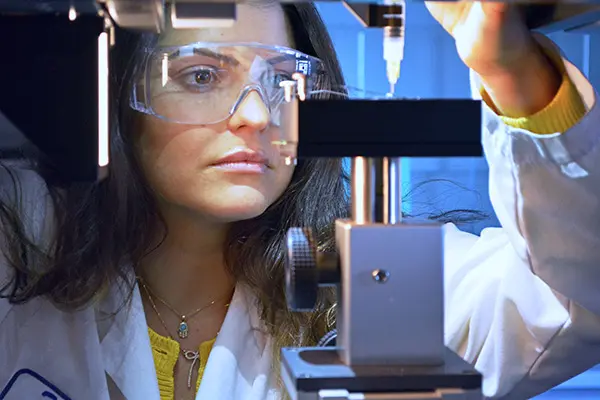Innovative Work by International Team of Faculty and Student Collaborators Is Awarded Two Patents

01/20/2018
By Edwin Aguirre
A team of plastics engineering faculty and student researchers at UMass Lowell and Shenkar College of Engineering, Design and Art in Israel has developed new self-cleaning coatings that are low-cost, durable and easy to apply; these could potentially revolutionize materials in the optical, aerospace, automotive and construction industries, among others.
The nanotechnology-based coatings have “superhydrophobic” surfaces that strongly repel water and ice, making them non-adhesive and non-wetting. This means they can resist corrosion and reduce friction, which translates into potential use in a wide range of commercial and military applications.
“The coatings are cost-effective and are based on commercially available materials,” says UMass Lowell Prof. Joey Mead, who is part of the research team that studied and fabricated the special coatings. “They can be easily applied by spray coating techniques over different surfaces and materials.”
Aside from Mead, the team also includes UML Prof. Carol Barry, Shenkar College Profs. Hanna Dodiuk and Samuel Kenig and Shenkar graduate Tehila Nahum, who earned her Ph.D. from UMass Lowell in 2016.
The results of the team’s innovative work were awarded two U.S. patents and have been published in leading academic journals and presented at technical conferences. Several companies have expressed interest in commercializing the technology.
In practical terms, the coatings can be used to treat the exterior of aircraft. For example, the wings and fuselage can be treated with superhydrophobic coatings to significantly decrease buildup of snow and ice, which can affect the plane’s flight control and safety. This also can help eliminate the need to use toxic chemical de-icers, reducing aircraft maintenance cost and servicing while minimizing environmental pollution. Superhydrophobic coatings can be applied to any new or existing surfaces, from ship hulls to kitchen appliances and medical devices.
Textile fibers treated with superhydrophobic coatings can be used in protective clothing and self-cleaning fabrics and tents to reduce soiling and cleaning cycles; surfaces coated with a layer of superhydrophobic material can be employed for anti-graffiti walls and display panels and car windshields, to name a few.
The Philanthropy of David Pernick
The partnership between UML and Shenkar College is made possible through the Pernick Fund, which was established by David Pernick, a 1941 textile engineering graduate of UMass Lowell (then Lowell Textile Institute). Before Pernick passed away in 2014, he and his wife, Frances, celebrated the 60th anniversary of his graduation by creating the International Program of Graduate Studies in Plastics Engineering. The program brings doctoral students like Nahum from Shenkar College (located in Ramat, Gan, near Tel Aviv) to UMass Lowell, as well as faculty from Lowell to Israel, to conduct research and collaborate in academics.
While completing her doctorate, Nahum performed studies at the university’s Center of Excellence in Nanomanufacturing and NSF Center for High-rate Nanomanufacturing, alongside Mead, Barry, Dodiuk and Kenig. Nahum helped develop novel, polymer nanoparticle-based superhydrophobic coatings that offer improved durability in terms of abrasion, erosion and scratch resistance under harsh conditions – work that formed the basis of her doctoral dissertation and for which the team was awarded the two patents.
“The joint intellectual property reinforces and enhances the academic and technical standing of the researchers from UMass Lowell and Shenkar,” says Kenig.
“We are excited about the possibilities for this technology. Without the support of the Pernick Fund, along with that of the federal government and the Commonwealth of Massachusetts over the years, none of this would have been possible. It is truly a story where philanthropy has led not only to educating our future engineers and scientists, but also strengthening the local economy and creating new materials to solve real-world problems,” notes Mead, who is the director of UMass Lowell’s Nanomanufacturing Center.
“Profs. Dodiuk and Kenig have been coming to UMass Lowell for research and to teach courses for the past five years. Prof. Barry and I have been going to Shenkar College almost every year. Since Tehila’s graduation, we have also co-advised other Shenkar students, including Orli Weitzmann and Eyal Cohen,” says Mead, who was named the 2017 UMass Lowell Distinguished University Professor.
“I have found this collaboration with faculty and students from Shenkar College to be one of the most enjoyable experiences of my professional career. I look forward to more great work as we go forward,” she says.
A Springboard to Professional Success
With her education and hands-on research experience with UMass Lowell and Shenkar College, Nahum has gone on to work as a principal formulations engineer at Adaptive Surface Technologies, Inc. (formerly SLIPS Technologies, Inc.) in Cambridge, Mass.
Nahum, who came to the university with a master’s degree from Shenkar and was able to complete her Ph.D. in less than three years, says her work through the Pernick Fund provided real-world, industry-oriented research experience that has given her an edge as a working professional.
“I am really thankful to the professors from both UMass Lowell and Shenkar College and to the Pernick Fund for giving me this wonderful opportunity,” she says.
